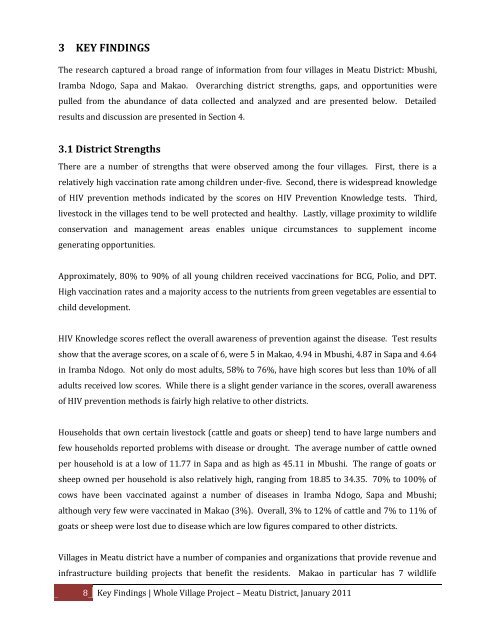Meatu District Report - Whole Village Project - University of Minnesota
Meatu District Report - Whole Village Project - University of Minnesota
Meatu District Report - Whole Village Project - University of Minnesota
Create successful ePaper yourself
Turn your PDF publications into a flip-book with our unique Google optimized e-Paper software.
3 KEY FINDINGS<br />
The research captured a broad range <strong>of</strong> information from four villages in <strong>Meatu</strong> <strong>District</strong>: Mbushi,<br />
Iramba Ndogo, Sapa and Makao. Overarching district strengths, gaps, and opportunities were<br />
pulled from the abundance <strong>of</strong> data collected and analyzed and are presented below. Detailed<br />
results and discussion are presented in Section 4.<br />
3.1 <strong>District</strong> Strengths<br />
There are a number <strong>of</strong> strengths that were observed among the four villages. First, there is a<br />
relatively high vaccination rate among children under-five. Second, there is widespread knowledge<br />
<strong>of</strong> HIV prevention methods indicated by the scores on HIV Prevention Knowledge tests. Third,<br />
livestock in the villages tend to be well protected and healthy. Lastly, village proximity to wildlife<br />
conservation and management areas enables unique circumstances to supplement income<br />
generating opportunities.<br />
Approximately, 80% to 90% <strong>of</strong> all young children received vaccinations for BCG, Polio, and DPT.<br />
High vaccination rates and a majority access to the nutrients from green vegetables are essential to<br />
child development.<br />
HIV Knowledge scores reflect the overall awareness <strong>of</strong> prevention against the disease. Test results<br />
show that the average scores, on a scale <strong>of</strong> 6, were 5 in Makao, 4.94 in Mbushi, 4.87 in Sapa and 4.64<br />
in Iramba Ndogo. Not only do most adults, 58% to 76%, have high scores but less than 10% <strong>of</strong> all<br />
adults received low scores. While there is a slight gender variance in the scores, overall awareness<br />
<strong>of</strong> HIV prevention methods is fairly high relative to other districts.<br />
Households that own certain livestock (cattle and goats or sheep) tend to have large numbers and<br />
few households reported problems with disease or drought. The average number <strong>of</strong> cattle owned<br />
per household is at a low <strong>of</strong> 11.77 in Sapa and as high as 45.11 in Mbushi. The range <strong>of</strong> goats or<br />
sheep owned per household is also relatively high, ranging from 18.85 to 34.35. 70% to 100% <strong>of</strong><br />
cows have been vaccinated against a number <strong>of</strong> diseases in Iramba Ndogo, Sapa and Mbushi;<br />
although very few were vaccinated in Makao (3%). Overall, 3% to 12% <strong>of</strong> cattle and 7% to 11% <strong>of</strong><br />
goats or sheep were lost due to disease which are low figures compared to other districts.<br />
<strong>Village</strong>s in <strong>Meatu</strong> district have a number <strong>of</strong> companies and organizations that provide revenue and<br />
infrastructure building projects that benefit the residents. Makao in particular has 7 wildlife<br />
8 Key Findings | <strong>Whole</strong> <strong>Village</strong> <strong>Project</strong> – <strong>Meatu</strong> <strong>District</strong>, January 2011



